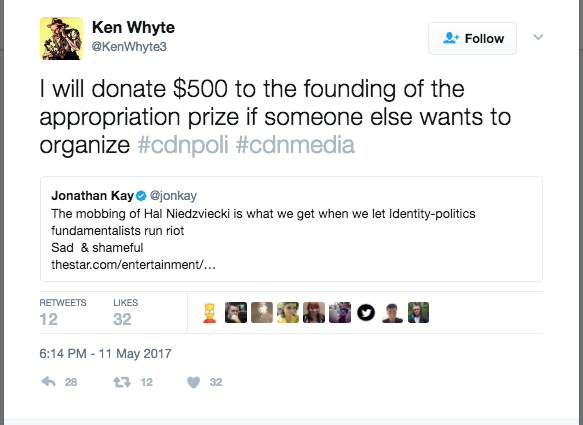Sometimes, when you do something stunningly boneheaded, you can get away with it. More often, you do not.
So it doesn’t take a genius to know that, if you’re devoting an issue of your magazine to a celebration of Indigenous writers, you don’t take the opportunity to encourage more white people to write about those subjects.
I mean, as if we haven’t had enough of that!
Hal Niedzviecki paid the price. This week he resigned as the editor of The Writers’ Union of Canada’s magazine, Write, after he wrote a piece called “Winning the Appropriation Prize.” He said he didn’t believe in cultural appropriation, and that writers (he meant white writers) “should be encouraged to imagine other peoples, other cultures, other identities.”
Many people — including the writers published in his magazine – thought it was insensitive and inappropriate. The Writers’ Union, which exists to promote “the rights, freedoms, and economic well-being of all writers,” had to apologize for its editor’s defence of cultural appropriation.
You also don’t have to be a genius to know that trying to paint Niedzviecki as a victim of a politically correct “mobbing” was also a grievous mistake. Yet that’s exactly what some of Canada’s top editors and news managers — all of them white and working for mainstream publications — did on Twitter.
It took Scaachi Koul, the wise young writer at Buzzfeed, to decode the racist semaphore for those who just don’t get it.
“The conversation was so nakedly cruel, with no shred of possible empathy for people who are really struggling to get their work read, recognized, and appreciated not only by an audience, but by these exact editors who act as gatekeepers to said audience,” she wrote.
“Even more egregious is that this whole argument was rooted in appropriation of Indigenous voices and stories, people who we’ve taken so much from already. Physical space, safety, bodies, culture — we can’t even let them tell their own stories in an issue of a magazine dedicated to their narratives without undercutting them first.”
So who are these news managers and why do they see Niedzviecki’s forced resignation as PC culture gone wrong, or (if you can believe this) an example of how free speech is being eroded in Canada?
First, you need to know their ugly shower of tweets happened around midnight, when most savvy Toronto journalistic blue bloods are usually heavily sedated with scotch at the Roof Lounge at the Park Hyatt or somewhere.
Ken Whyte, formerly the president of Rogers Publishing, started it off, tweeting: “I will donate $500 to the founding of the appropriation prize if someone else wants to organize.” That was apparfently prompted by a tweet from Jon Kay, editor of The Walrus, who said “the mobbing of Hal Niedzviecki is what we get when we let identity-politics fundamentalists run riot. Sad and shameful.”
The fundraising quickly developed momentum. Whyte’s campaign was joined by Anne Marie Owens, editor in chief of the National Post, Alison Uncles, editor in chief of Maclean’s magazine, Steve Ladurantaye, the CBC’s manager of digital news, Steve Maich, head of digital content and publishing for Rogers Media, Maclean’s columnist Scott Feschuk, and Christie Blatchford of the National Post.
Within three hours, Whyte announced: “Yay AMO! We have a $2000 prize, 500 for drinks, 500 for a room and $200 for canapés! Keep it coming. Look out.” He urged them to push for $5,000.
Say what you want about the spectacle of the cream of Canadian journalism staying up half the night engaged in a (perhaps jocular) challenge about as credible as Donald Trump praising the role of women in business. Just locker room humour. You know, like saying you can grab someone’s pussy. A few walked back their support the next morning when the shit hit the fan, but the fact is, the whole thing was deeply offensive, and they deserve to be pilloried.
And it certainly raised larger questions, about the embarrassing, stone-deaf whiteness of the Canadian media.
If they’re serious about free expression, why don’t they encourage the people they say they want to see in stories to write their own stories?
Why don’t they choose to publish more Indigenous writers, or, better still, hire them?
Why is it that some of them talk about the importance of diversity, but don’t walk it?
Why do they seem to fear their white voices will be relegated to the sidelines if they allow marginalized minorities to speak for themselves?
Why don’t they stop waving the false flag of free expression when they’ve demonstrated they don’t know what it means?
Another journalist of colour, the Toronto Star’s Shree Paradkar, explained the betrayal behind their Twitter yukfest.
There’s a difference between allyship and appropriation, she wrote. “Fighting for the idea that we should all have the freedom to tell each other’s stories is a mere affectation, a call to action for a phoney cause, when it comes from the only group of people that gets to tell those stories. This is white people saying, allow us to tell other peoples’ stories because we’re not going to let the others tell them.”
If we’re going to raise money, let’s raise it to make Canadian journalism more representative of society.
It can’t afford to remain as white as the pages it’s printed on.
You know, because it’s 2017.
Image: Twitter/KenWhyte3
Like this article? Please chip in to keep stories like these coming.




